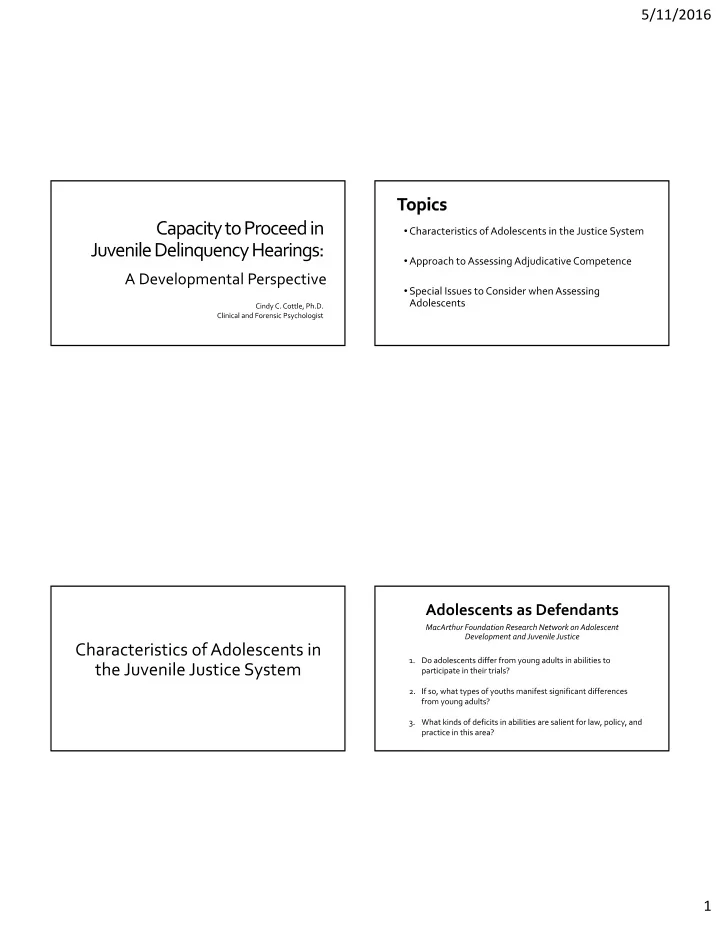

5/11/2016 A Developmental Perspective 1
5/11/2016 2
5/11/2016 Logical reasoning Abstract Thought • Ability to analyze situations • Ability to think realistically about the future and set goals • Ability to consider options • Planning • Ability to consider hypothetical situations • Problem Solving Impulse Control Autonomy • Temperance • Independent decision making (from peers/parents) • Ability to keep emotions in check • Conformity & Compliance • Ability to benefit from past experience/learning • Abstract thought •Abstract thought • Logic/ Planning •Logical reasoning • Impulse control •Impulse control • Experience •Experience Perceptions Autonomy of Risk Abstract Time Thinking Perspective • Logical reasoning • Abstract thought • Impulse control • Logical reasoning • Experience • Experience 3
5/11/2016 Perceived Perceptions Ability to understand the Autonomy of Risk nature and object of the proceedings against him, Ability to comprehend his Abstract own situation in reference to and Time the proceedings, Concrete Perspective Thinking Ability to assist in his defense in a rational or reasonable manner. 4
5/11/2016 Order for Evaluation: What to Consider Location (LME, hospital, private) Evaluator Qualifications Time Cost Order for Evaluation 1.Detailed referral question(s) and expectations 2.Expected timeframe 3.Funding (if private) 4.Access to records http://www.mentalhealthandlaw.com/evaluationmethods.html 5
5/11/2016 Translate Legal Criteria to Psychological Constructs Legal Criteria Forensic ‐ Psychological Construct Possible Assessment Methods By reason of mental • Mental health diagnosis Mental Illness Mental Illness Interview, mental status exam, psychological testing, mental health records, interview with caregivers & others illness or defect • Intellectual disability Mental Defect Developmental disability, intellectual disability, neurological condition IQ testing, records (school, mental health), interviews with caregivers & others Understand nature and • Factual understanding of system and charges object of proceedings • Appreciation of system and charges Ability to understand nature Factual understanding of purpose of adjudication and hearings, roles of Forensic interview and testing and object of proceedings participants, name/seriousness of charges, possible penalties, possible (Juvenile Adjudicative Competence Interview) pleas, adversarial nature, potential consequences/risks Comprehend his Ability to comprehend his own Ability to appreciate role as juvenile (“defendant”), rights as (to plea, to Forensic interview and testing •Appreciation of legal situation and implications situation in reference to the testify, to remain silent), potential consequences and risks, and role as situation proceedings active participant in the context of working with a defense attorney Ability to Assist in his defense in Ability to attend, maintain self ‐ control, ability to testify, ability to make Behavioral observation, interview with attorney, and a rational or reasonable manner decisions in a rational manner and without undue influence forensic interview and testing • Understand and appreciate role of attorney Assist in rational or • Decision making capacities reasonable manner • Attend and cooperate during hearings Forensic interview and testing (and re ‐ testing for retention Capacity to Learn What degree of remediation would be required if the person is not and ability to apply concepts) competent? 6
5/11/2016 Factual Understanding • Rational Appreciation • Ability to Assist Counsel • Legal Decision Making • 7
5/11/2016 8
5/11/2016 Functional Question • What competency deficits exist? Thomas Grisso’s Causal Question Forensic Evaluation Model (2003) • What are the causes of the deficits? Contextual Question A framework for decision • How will the deficits impact this examinee in this case? making about capacities during the forensic evaluation Conclusory Question process • Are the deficits adequately impairing to meet legal test? Remedial Question • Can the deficits be remediated within the legal timeframe? How? Factual Understanding: Terminology, Roles of Courtroom Personnel: John was aware of the pleas of guilty (“You did it”) and Not Guilty (“You didn’t do it”). He reported that if a person pleads guilty (or admits the offense), then the person will be given “probation or lock-up.” He reported that if a person pleads not guilty or does not admit to the offense, then, he stated, “They drop the charges I guess.” John was provided corrective feedback as to the sequence of events that follow a plea of “not guilty.” Specifically, he was told that there is a hearing in which both sides present evidence to the Judge. 9
5/11/2016 10
5/11/2016 11
5/11/2016 12
5/11/2016 • Location of treatment • Length of treatment 13
5/11/2016 cindycottle@gmail.com www.mentalhealthandlaw.com 14
Recommend
More recommend